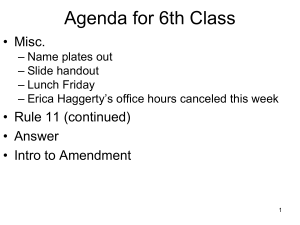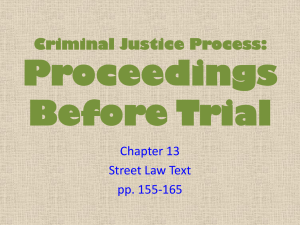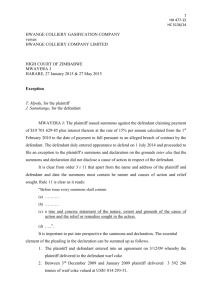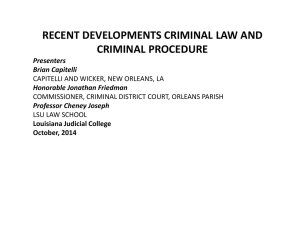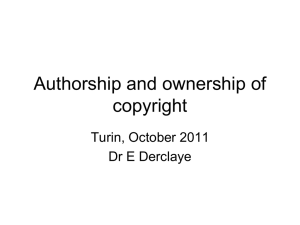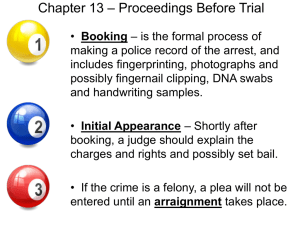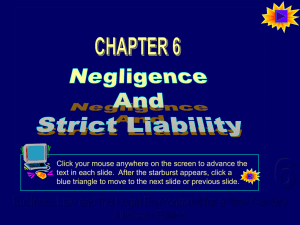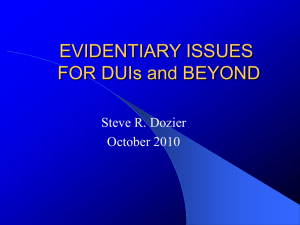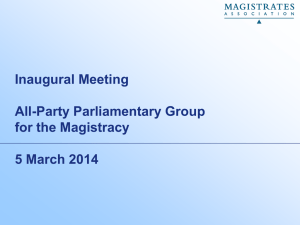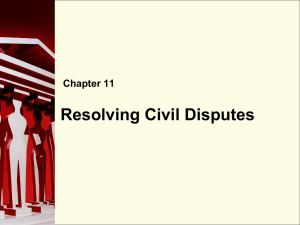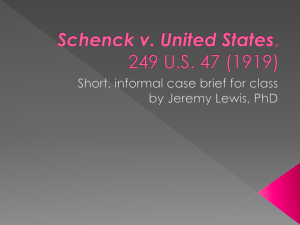MotionsApplicationsRequests for Entry of Default
advertisement
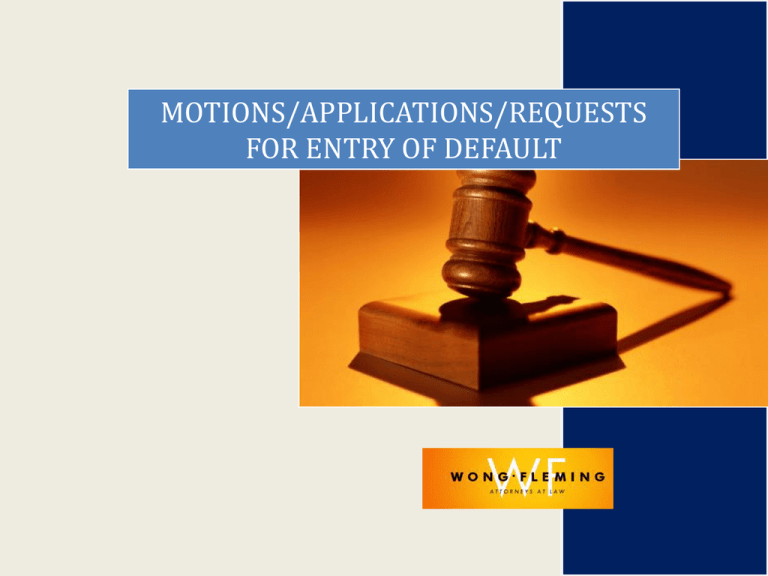
MOTIONS/APPLICATIONS/REQUESTS FOR ENTRY OF DEFAULT (a) ENTERING A DEFAULT. When a party against whom a judgment for affirmative relief is sought has failed to plead or otherwise defend, and that failure is shown by affidavit or otherwise, the clerk must enter the party's default. (b) ENTERING A DEFAULT JUDGMENT. (1) By the Clerk. If the plaintiff's claim is for a sum certain or a sum that can be made certain by computation, the clerk—on the plaintiff's request, with an affidavit showing the amount due— must enter judgment for that amount and costs against a defendant who has been defaulted for not appearing and who is neither a minor nor an incompetent person. (2) By the Court. In all other cases, the party must apply to the court for a default judgment. A default judgment may be entered against a minor or incompetent person only if represented by a general guardian, conservator, or other like fiduciary who has appeared. If the party against whom a default judgment is sought has appeared personally or by a representative, that party or its representative must be served with written notice of the application at least 7 days before the hearing. The court may conduct hearings or make referrals—preserving any federal statutory right to a jury trial—when, to enter or effectuate judgment, it needs to: (A) conduct an accounting; (B) determine the amount of damages; (C) establish the truth of any allegation by evidence; or (D) investigate any other matter. (c) SETTING ASIDE A DEFAULT OR A DEFAULT JUDGMENT. The court may set aside an entry of default for good cause, and it may set aside a default judgment under Rule 60(b). For example, Central District of California requires that an application for a default judgment be accompanied with a declaration include the following: ◘ When and against what party the default is requested; ◘ The identification of the pleading to which the default will be entered against; ◘ Whether the defaulting party is an infant or incompetent person, and if so, whether that person is represented by a general guardian, committee, conservator or other representative; ◘ That the service members Civil Relief Act (50 U.S.C. App. Section 521) does not apply; and ◘ That Notice has been served on the defaulting party, if required by F.R.Civ. P. 55 (b)(2). (2) The party has failed to plead or otherwise defend within the allowed time and that time has run. (3) The party has not requested or has not been granted an extension of time to plead or otherwise defend. (1) The party against whom default is sought has been properly served with a summons and a complaint. Requires that the moving party file with the application an affidavit including: ◘ After 30 days from the date of Service, a Plaintiff may proceed to obtain an entry of default against a Defendant who has failed to answer. ◘ Before proceeding to file anything with the Court, confirm your timeline, that service was in fact proper. ◘ Confirm that your Proof of Service was filed with the Court. Sample Proof of Service Judicial Form: http://www.courts.ca.gov/documents/pos010.pdf ◘ Confirm whether you need to file a Declaration of Venue: If your lawsuit is based upon a retail installment contract subject to the Unruh Act (Civil Code §1812.10), on a financed automobile subject to the Rees-Levering Motor Vehicle Sales and Finance Act (Civil Code §2984.4), or on a loan or other extension of credit primarily for personal or household use (Code of Civil Procedure § 395(b)), you must either verify your complaint or file and serve a declaration of venue. The declaration of venue must be served upon the defendants like a Summons. If your complaint was not verified and you did not serve the statement of venue you must complete this step at least 31 days before filing the Request for Entry of Default. Sample: http://www.saclaw.org/Uploads/files/forms/Venue_Decl_fillable.pdf : Element 1: Duty – That the Defendant owed a duty to the Plaintiff; Element 4: Damages – That you were harmed. Negligence Element 3: Causation – That the Defendant’s negligence was a substantial factor in causing your harm; Element 2: Breach – That the Defendant breached that duty; ◘ Submit a Proposed Judgment with the Request for Entry of Default. ◘ Look at jurisdictional requirements for the type of complaint filed. For example, in California, an action to quiet title REQUIRES a prove up hearing under Cal. Code of Civ. Procedure Section 764.010; ◘ Dismiss any named or doe defendants who should no longer be in the case; ◘ Send a check for any applicable fees for filing the Request; ◘ Wait for the Court to enter a default; ◘ Remember, if there are any hearings on the matter, for example, a Case Management Conference or Status Conference, you should be prepared to appear at the hearing, even if to say that you are waiting on the Court to process the Request for Entry of Default. - Washington Court’s prefer entering judgment based on the merits of a case: - Default judgments are disfavored because it is the policy of the law that controversies be determined on the merits rather than by default. Colacurcio v. Burger 110 Wash.App. 488, 41 P.3d 506 (2002). 1. Make sure Complaint and Summons were properly served on the opposing party. 2. Calendar exactly the day Answer was due. Defendant has 20 days from date of service to Answer. See CR 12(a)(1). 3. If defendant is represented by counsel or appeared send letter send reminder that they are tardy and your intention to file a Motion for Default within 5 days of letter, if no Answer filed. 4. If Defendant files Notice of Appearance they still MUST file an Answer within 20 days of date of service. However, you cannot do a motion for default without notice to defendant or their counsel. No Answer or appearance: File Motion for Default without Notice (including all 7 parts listed in the box to the left). Wait 20 Days for Answer or Notice of Appearance Serve Complaint and Summons: Note: Determine if person is serving in the military overseas. In King County, a Motion for Default is divided up into seven parts, with modifications: 1) Relief Requested 2) Statement of Facts; 3) Issued Presented; 4) Evidence Relied Upon; 5) Legal Argument; 6) Conclusion; 7) Proposed Order Appearance, but no Answer: File Motion for Default with Service to Defendant or Defendant’s Counsel (including all 7 parts listed in box to the left.) ** * Include in your declaration that a search has been done on the defendant under the Servicemember Civil Relief Act Statement and the person is not a service member or deployed. 2. Statement of facts : a. Include when matter was originally filed. b. When opposing party was served with Summons and Complaint. c. Include the declaration of service as exhibit. d. State that opposing party failed to Answer within 20 days as required by CR 12(a)(1). If defendant does appear state it in facts. e. If applicable State when you notified opposing party or their counsel of their failure to file Answer and request that they file Answer within 5 days of correspondence. f. State if there was any response or agreement from OA or defendant to file Answer and ultimately how they failed. g. If extra time is granted state that the date came and left without any production of outstanding discovery. 3. Issue Presented: Whether the Court should grant a Motion for Default when Defendant has failed to Answer as required by CR 12(a)(1) 4. Evidence Relied Upon: - Include your declaration and any exhibits. - This includes when Complaint and Answer was served on defendant. - This includes the Answer due. - Optional: Date of when defendant appeared or defense counsel filed notice of appearance. -Optional: Date when letter sent to defendant or defense counsel that they have not filed Answer and request that Answer be filed within 5 days. - Optional: Date of service of Motion for default. 5. Legal Argument Why Motion to Compel should be granted?: - Under CR 12(a)(1) a “Defendant shall serve his answer within 20 days, exclusive of the day of service, after the service of the summons and complaint upon him pursuant to rule 4; …” - Default judgments are disfavored because it is the policy of the law that controversies be determined on the merits rather than by default. Colacurcio v. Burger 110 Wash.App. 488, 41 P.3d 506 (2002). - Default judgments are normally proper only when the adversary process has been halted because of an essentially unresponsive party. Colacurcio v. Burger 110 Wn.App. 488, 41 P.3d 506, (2002). PRO TIP: Plaintiff is not entitled to default judgment as a matter of right under CR 55(b)(1) when amount due is not certain. J-U-B Engineers, Inc. v. Routsen 69 Wash.App. 148, 848 P.2d 733 (1993). PRO TIP: Party against whom default judgment is sought is not entitled to notice of CR 55(b)(2) hearing to determine previously unspecified damages. JU-B Engineers, Inc. v. Routsen 69 Wash.App. 148, 848 P.2d 733 (1993). PRO TIP: Conduct search prior to filing motion to determine if defendant is serving in the military overseas. If defendant is serving motion will not be granted. Application: Apply the facts to their failure to Answer. For example: Here, John Doe was properly served on January 1, 2013. It is now January 30, 2013, and defendant failed to Answer, defend, or appear within 20 days of service. The adversary process in this matter has been halted by defendant’s intentional and willful actions as a unresponsive party. Because over twenty days have elapsed and defendant has failed to Answer despite Plaintiff ’s entreaties, the time allowed for filing of pleadings is now closed and Defendant has failed to conform with CR 12(a)(1). Because Defendant has failed to conform with CR 12(a)(1), Plaintiff is entitled to an Order for Default. Under CR 55(a)(1) “When a party against whom a judgment for affirmative relief is sought has failed to appear, plead, or otherwise defend as provided by these rules and that fact is made to appear by motion and affidavit, a motion for default may be made. Apply the facts to CR 55: For example: Here the summons and complaint was properly served on _____________. Over twenty days have elapsed since the Defendants were served and the Defendant has failed to appear, plead or otherwise defend against the Plaintiffs’ complaint. Because the Defendants have failed to appear, plead, or otherwise defend this matter in a timely manner as proscribed by the Washington Rules, the Plaintiff therefore is entitled to an Order of Default and Entry of Judgment. Conclusion - For the aforementioned reasons, Plaintiff respectfully asks this Court to Grant its Motion. Always attach a Proposed Order detailing exactly what you are requesting the Court to do.

